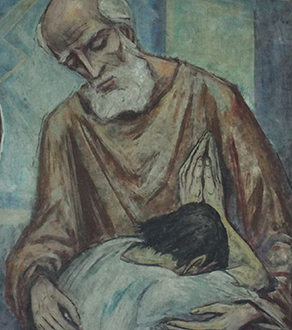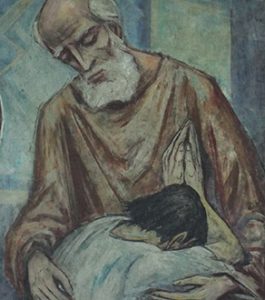[:en]

The Resurrection of the Lord
Reflection
Do we see what he sees?
The Resurrection of the Lord
Acts 10:34A, 37-43
Peter proceeded to speak and said: “You know what has happened all over Judea, beginning in Galilee after the baptism that John preached, how God anointed Jesus of Nazareth with the Holy Spirit and power. He went about doing good and healing all those oppressed by the devil, for God was with him. We are witnesses of all that he did both in the country of the Jews and in Jerusalem. They put him to death by hanging him on a tree. This man God raised on the third day and granted that he be visible, not to all the people, but to us, the witnesses chosen by God in advance, who ate and drank with him after he rose from the dead. He commissioned us to preach to the people and testify that he is the one appointed by God as judge of the living and the dead. To him all the prophets bear witness, that everyone who believes in him will receive forgiveness of sins through his name.”
Colossians 3:1-4
Brothers and sisters: If then you were raised with Christ, seek what is above, where Christ is seated at the right hand of God. Think of what is above, not of what is on earth. For you have died, and your life is hidden with Christ in God. When Christ your life appears, then you too will appear with him in glory.
John 20:1-9
On the first day of the week, Mary of Magdala came to the tomb early in the morning, while it was still dark, and saw the stone removed from the tomb. So she ran and went to Simon Peter and to the other disciple whom Jesus loved, and told them, “They have taken the Lord from the tomb, and we don’t know where they put him.” So Peter and the other disciple went out and came to the tomb. They both ran, but the other disciple ran faster than Peter and arrived at the tomb first; he bent down and saw the burial cloths there, but did not go in. When Simon Peter arrived after him, he went into the tomb and saw the burial cloths there, and the cloth that had covered his head, not with the burial cloths but rolled up in a separate place. Then the other disciple also went in, the one who had arrived at the tomb first, and he saw and believed. For they did not yet understand the Scripture that he had to rise from the dead.
May Tam
 The saying, “seeing is believing” which relies solely on sensory perception as the guarantor of truth, can no longer be considered as the touchstone of credibility anymore. For computer technology is now able to simulate, exaggerate, enhance or distort reality and thus can deceive the human eye. Even without such technology, our physical eyes can only see the surface of things and sheer physical seeing cannot plumb the depths where the truth lies.
The saying, “seeing is believing” which relies solely on sensory perception as the guarantor of truth, can no longer be considered as the touchstone of credibility anymore. For computer technology is now able to simulate, exaggerate, enhance or distort reality and thus can deceive the human eye. Even without such technology, our physical eyes can only see the surface of things and sheer physical seeing cannot plumb the depths where the truth lies.
In light of this consideration, let us try to understand the different episodes in each of the Gospels today. While the resurrection of Jesus undergirds our Christian faith, no human eye has been privileged to witness Jesus’ rising from the tomb. Mary Magdalene and the other women, Peter and the beloved disciple or the two disciples on the way to Emmaus, all witness only the telltale signs, namely, the empty tomb, the burial wrappings and the hearsay from others. In the case of Mary Magdalene, the other women, Peter and the other beloved disciple, they all see and share the same sensory experience. Mary Magdalene thinks it is a tomb robbery (rf Jn 20:2); the other women are too frightened to say anything (rf Mk 16:8); Peter is bewildered and confused (rf Lk 24;12). Only the beloved disciple comes to believe: “He saw and believed” (Jn 20:8).
What does the beloved disciple see that makes him believe Jesus is alive again? He does not actually see the risen Jesus with his naked eyes. If seeing is believing; then his conviction would make little sense. And yet he believes even in the darkness of incomprehension with mere superficial signs. St. Paul in his letter to the Ephesians says: “May the eyes of your hearts be enlightened, that you may know what is the hope that belongs to his call, what are the riches of glory in his inheritance among the holy ones, and what is the surpassing greatness of his power for us who believe” (Eph 1, 17-18). Yes, it is with these “eyes of the heart” which the beloved disciple sees and make him believe.
What are the eyes of the heart? For the Hebrews, the heart is not a blind and wanton generator of emotions but the seat of discernment and decisions. It is here that believing takes place and a heart that loves begets faith. Faith and believing belong to the domain of the heart which precedes intellectual understanding and reasoning. In fact, it is the love of God that generates a certain intellectual light – wisdom that opens the eyes of the heart to see beyond what is visible. It illumines so that one can recognize the truth even before the mind could grasp its full meaning. Jesus Himself says this, “. . . seeing they do not see, and hearing they do not hear, neither do they understand” (Mt 13:13). Realizing that, St. Augustine says: “I believe in order to understand”. But how often do we ourselves say or hear “I will believe when I understand”. It turns out, in most cases, we rarely understand and thus, rarely believe.
Each one of us can be the beloved disciple if we choose not to understand God but to love and trust Him first. Come to know Him personally and then we can see what the beloved disciple sees. Until we have Him in our hearts rather than in our heads, we cannot believe.
May Tam
Bachelor of Social Science (University of Hong Kong), Master of Theological Studies (University of Toronto).

四旬期第四主日 (丙年)
主日聖言及反省
最偉大的故事
四旬期第四主日
若蘇厄書 5:9,10-12
格林多後書 5:17-21
路加福音 15:1-3,11-32
Ben Cheng

在這四旬期第四主日,我們有幸讀到耶穌最偉大的一個比喻,蕩子的故事。這讓我想起盧雲神父(Henri Nouwen)所著的「蕩子回頭」一書。這本書描述了倫勃朗( Rembrandt)的同名名畫,畫中的每一細節和靈性上的反思。這是所我讀過最令人愛不釋手,非常精彩的一本書。這是有史以來最偉大的故事,把天主是誰娓娓道來,並解釋我們應如何與祂建立正確的關係。
耶穌在開始講述這比喻時,我們聽到象徵罪人的小兒子,很過份地侮辱父親,要求將屬於他的一份家業立刻給他。「父親,請把我應得的一份家產給我罷!」(路 15:12)。說話中他三次強調「我」,這便是問題的癥結。父親對兒子的侮辱卻置諸不理,竟把兒子所要求的給了他。此事在靈性上的深層意義,是我們許多人都希望能得到天主的恩賜(美好的生活、成功、健康和愛情),認為是我們擁有的,但卻沒有和施與者建立正確的關係。在靈性上,這是永遠不成的。我們的天主是一個超性的泉源,祂賜給我們一切,並存在於給我們的恩賜中。當我們走離這恩寵泉源並拒絕承認祂時,恩典便會枯竭。這便是小兒子遊走至的空間,希臘語中的“chóra makros”,意思是「無盡的空虛」。脫離了恩寵之源,我們便會墮進這空間。這個比喻再進一步敍述道德敗壞的情況,「那地方正遇著大荒年…… 可是沒有人給他」(路 15:14-16)。禍不單行,單單靈性上的空虛仍不夠苦,飢荒爆發,加深了他身體和靈性上的貧困。這靈性上的言語表示,與天主分離,我們不單止便沒有生命,事實上,我們更會變得不是人,「他恨不能拿豬吃的豆莢來果腹」(路 15:16)。此外,當他進入了計算,合約和交換的「無盡空虛」中,沒有人會給他任何東西。相對來說,他父親的住處卻是恩典豐盛,無償給與的地方!
陷入最低谷時,小兒子「便起身到他父親那裏去了」(路 15:20)。我們是罪人,一生中,會發現自己多次在這空間。物質上,我們可能仍過著富足的生活,但靈性,卻遠離天主,或自我放縱,像蕩子一樣陷入了低谷窘境。這是我們遊走進的土地,最終難免乾涸。雖然如此,重點的是我們要下定決心回頭!天主是愛,祂親切慈愛,更尊重我們的自由。沒有自由,我們的生命就不屬於我們。因此,立下決心是不可或缺的,要集中提起自由、勇氣和精力去回頭。當我們一轉念回頭時,恩典會充滿著我們。那位父親一直在等待和守候,當看到他小兒子時便「跑上前去」(路 15:20)。這是多麼尷尬!在猶太人傳統,年長男人會上坐,人會來到他面前。一個老人要跑是非常沒尊嚴的,但我們的天主竟然因愛我們會這樣做,衪充滿聖寵!那父親擁抱年輕人說:「拿出上等的袍子來給他穿上,把戒指戴在他手上」(路 15:20)。在「蕩子回頭」畫中,倫勃朗讓我們看到,當父親擁抱著他的小兒子時,光並非來自外面的任何光源,而是從父親身上散發出來。這多美麗!我們的天主毫不吝嗇地傾注祂的愛給我們,祂只想我們回到祂恩寵的棧內。這恩典是至歡欣喜悦的,因為這是真正的慶典,像比喻中所描述的「盛宴」。耶穌說:「我對你們講論了這些事,為使我的喜樂存在你們內,使你們的喜樂圓滿無缺」(若15:11)。這就是父親的態度。聖經是一個天主義無反顧地尋覓我們的故事。我們的天主,一心只想把我們帶回祂恩寵的棧裡,甚至謙卑自己,即使是去到任何莫名奇妙的溪水畔,「失落的我要尋找;迷路的,我要領回」(則 34:16)。
我們準備好進入這恩典的韻律嗎?我們是否已準備好回應這父親,一位只想我們的生命活力充沛的父親?讓這發人深省的比喻在我們的心靈中沉澱,洗滌我們,感動我們投入故事,並在靈性上啟發光照我們。
鳴謝
這是 Bishop Robert Barron 講道摘錄,包括
“The Prodigal Son”, “The Father and the Son”, 和 “The Lesson of the Prodigal Son”. 詳情請溜覧 WordOnFire.org.

四旬期第四主日
主日圣言及反省
最伟大的故事
四旬期第四主日
若苏厄书 5:9,10-12
那时候,上主对若苏厄说:「今天我由你们身上,消除了埃及的耻辱。」以色列子民在基耳加耳扎营。正月十四日晚上,在耶里哥平原,举行了逾越节。逾越节次日,他们吃了当地的出产,即在那一天,吃了无酵饼和火烤的麦子。他们吃了当地出产的次日,「玛纳」就停止了。以色列子民既没有「玛纳」,那年,就以客纳罕地的出产为生。——上主的话。
格林多后书 5:17-21
弟兄姊妹们:谁若在基督内,他就是一个新受造物,旧的已成过去,看,都成了新的。这一切都是出于天主;他曾借基督,使我们与他自己和好,并将这和好的职务,赐给了我们;这就是说:天主在基督内,使世界与自己和好,不再追究他们的过犯,且将和好的话,放在我们口中。所以,我们是代基督作大使了,好像是天主借着我们,来劝勉世人。我们现在代基督请求你们:与天主和好吧!因为他曾使那不认识罪的,替我们成了罪,好叫我们在他内,成为天主的正义。——上主的话。
路加福音 15:1-3,11-32
那时候,税吏及罪人,都来接近耶稣,为听他讲道。法利塞人及经师窃窃私议,说:「这个人与罪人交往,又同他们吃饭。」耶稣于是对他们设了这个比喻,说:「一个人,有两个儿子,那小的,向父亲说:父亲,请把我应得的一份家产,分给我吧!父亲于是把产业,分给他们。过了不多几天,小儿子把所有的一切,都收拾起来,就往远方去了。他在那里荒淫度日,耗尽他的钱财。「当他把所有的,都挥霍尽了以后,那地方正遇着大荒年,他便开始穷困起来。他去投靠当地一个居民;那人打发他,到自己的庄田里,去放猪。他恨不得拿猪吃的豆荚,来果腹,可是,没有人给他。「他反躬自问:我父亲有多少佣工,都口粮丰盛,我在这里,反要饿死!我要起身,到我父亲那里去,并且要给他说:父亲!我得罪了天,也得罪了你。我不配再称作你的儿子;请把我当作你的一个佣工吧!他便起身,到他父亲那里去了。「他离的还远的时候,他父亲就看见了他,动了怜悯的心,跑上前去,拥抱他,热情地亲吻他。「儿子向他父亲说:父亲,我得罪了天,也得罪了你,我不配再称作你的儿子!「他父亲却吩咐自己的仆人,说:你们快拿出上等的长袍,给他穿上,把戒指戴在他手上,给他穿上鞋,再把那只肥牛犊牵来,宰了;我们应吃喝欢宴,因为我这个儿子,是死而复生,失而复得了。他们就欢宴起来。「那时,他的长子,正在田里。当他回来,快到家的时候,听见有奏乐及歌舞的声音,于是叫一个仆人过来,问他这是什么事。「仆人向他说:你弟弟回来了。你父亲因为见他无恙归来,便为他宰了那只肥牛犊。长子就发怒,不肯进去。他父亲于是出来,劝解他。「他回答父亲说:你看,这些年来,我服事你,从未违背过你的命令,而你从未给过我一只小山羊,让我同我的朋友们欢宴;但你这个儿子,同娼妓耗尽了你的财产,他一回来,你反而为他宰了那只肥牛犊。「父亲给他说:孩子!你常同我在一起,凡我所有的,都是你的;只因为你这个弟弟,死而复生,失而复得,我们应当欢宴喜乐!」
Ben Cheng
 在这四旬期第四主日,我们有幸读到耶稣最伟大的一个比喻,荡子的故事。这让我想起卢云神父(Henri Nouwen)所着的「荡子回头」一书。这本书描述了伦勃朗( Rembrandt)的同名名画,画中的每一细节和灵性上的反思。这是所我读过最令人爱不释手,非常精彩的一本书。这是有史以来最伟大的故事,把天主是谁娓娓道来,并解释我们应如何与祂建立正确的关系。
在这四旬期第四主日,我们有幸读到耶稣最伟大的一个比喻,荡子的故事。这让我想起卢云神父(Henri Nouwen)所着的「荡子回头」一书。这本书描述了伦勃朗( Rembrandt)的同名名画,画中的每一细节和灵性上的反思。这是所我读过最令人爱不释手,非常精彩的一本书。这是有史以来最伟大的故事,把天主是谁娓娓道来,并解释我们应如何与祂建立正确的关系。
耶稣在开始讲述这比喻时,我们听到象征罪人的小儿子,很过份地侮辱父亲,要求将属于他的一份家业立刻给他。「父亲,请把我应得的一份家产给我罢!」(路 15:12)。说话中他三次强调「我」,这便是问题的症结。父亲对儿子的侮辱却置诸不理,竟把儿子所要求的给了他。此事在灵性上的深层意义,是我们许多人都希望能得到天主的恩赐(美好的生活、成功、健康和爱情),认为是我们拥有的,但却没有和施与者建立正确的关系。在灵性上,这是永远不成的。我们的天主是一个超性的泉源,祂赐给我们一切,并存在于给我们的恩赐中。当我们走离这恩宠泉源并拒绝承认祂时,恩典便会枯竭。这便是小儿子游走至的空间,希腊语中的“chóra makros”,意思是「无尽的空虚」。脱离了恩宠之源,我们便会堕进这空间。这个比喻再进一步叙述道德败坏的情况,「那地方正遇着大荒年…… 可是没有人给他」(路 15:14-16)。祸不单行,单单灵性上的空虚仍不够苦,饥荒爆发,加深了他身体和灵性上的贫困。这灵性上的言语表示,与天主分离,我们不单止便没有生命,事实上,我们更会变得不是人,「他恨不能拿猪吃的豆荚来果腹」(路 15:16)。此外,当他进入了计算,合约和交换的「无尽空虚」中,没有人会给他任何东西。相对来说,他父亲的住处却是恩典丰盛,无偿给与的地方!
陷入最低谷时,小儿子「便起身到他父亲那里去了」(路 15:20)。我们是罪人,一生中,会发现自己多次在这空间。物质上,我们可能仍过着富足的生活,但灵性,却远离天主,或自我放纵,像荡子一样陷入了低谷窘境。这是我们游走进的土地,最终难免干涸。虽然如此,重点的是我们要下定决心回头!天主是爱,祂亲切慈爱,更尊重我们的自由。没有自由,我们的生命就不属于我们。因此,立下决心是不可或缺的,要集中提起自由、勇气和精力去回头。当我们一转念回头时,恩典会充满着我们。那位父亲一直在等待和守候,当看到他小儿子时便「跑上前去」(路 15:20)。这是多么尴尬!在犹太人传统,年长男人会上坐,人会来到他面前。一个老人要跑是非常没尊严的,但我们的天主竟然因爱我们会这样做,衪充满圣宠!那父亲拥抱年轻人说:「拿出上等的袍子来给他穿上,把戒指戴在他手上」(路 15:20)。在「荡子回头」画中,伦勃朗让我们看到,当父亲拥抱着他的小儿子时,光并非来自外面的任何光源,而是从父亲身上散发出来。这多美丽!我们的天主毫不吝啬地倾注祂的爱给我们,祂只想我们回到祂恩宠的栈内。这恩典是至欢欣喜悦的,因为这是真正的庆典,像比喻中所描述的「盛宴」。耶稣说:「我对你们讲论了这些事,为使我的喜乐存在你们内,使你们的喜乐圆满无缺」(若15:11)。这就是父亲的态度。圣经是一个天主义无反顾地寻觅我们的故事。我们的天主,一心只想把我们带回祂恩宠的栈里,甚至谦卑自己,即使是去到任何莫名奇妙的溪水畔,「失落的我要寻找;迷路的,我要领回」(则 34:16)。
我们准备好进入这恩典的韵律吗?我们是否已准备好回应这父亲,一位只想我们的生命活力充沛的父亲?让这发人深省的比喻在我们的心灵中沉淀,洗涤我们,感动我们投入故事,并在灵性上启发光照我们。
鸣谢
这是 Bishop Robert Barron 讲道摘录,包括
“The Prodigal Son”, “The Father and the Son”, 和 “The Lesson of the Prodigal Son”. 详情请溜覧 WordOnFire.org.
